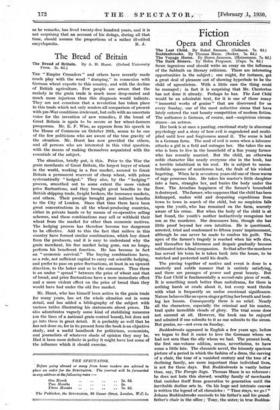The Bread of Britain
THE " Empire Crusaders " and others have recently made much play with the word " dumping," in connexion with German wheat exports to this country, and with the decline of British agriculture. Few people are aware that the malady in the grain trade is much more deep-seated and much more injurious than this diagnosis would indicate. They are not conscious that a revolution has taken place in this trade which not only renders all comparison of present with pre-War conditions irrelevant, but calls with no uncertain voice for the invention of new remedies, if the bread of Great Britain is again to be secure or her wheat-farmers prosperous. Mr. E. F. Wise, as appears from his speech in the House of Commons on October 30th, seems to be one of the few politicians who are aware of the true gravity of the situation. • Mr. Hurst has now provided the others, and all persons who are interested in this vital question, with the means of making themselves acquainted with the essentials of the subject.
The situation, briefly put, is this. Prior to the War the grain merchants of Great Britain, the largest buyer of wheat in the world, working in a free market, assured to Great Britain a permanent reservoir of cheap wheat, with prices systematically " hedged." They also, by the " hedging " process, smoothed out to some extent the more violent price fluctuations, and they brought great benefits to the British shipping trade, freight brokers, the insurance markets, and others. Their prestige brought great indirect benefits to the City of London. Since that time there have been great concentrations in all the wheat-producing countries, either in private hands or by means of co-operative selling schemes, and these combinations may sell or withhold their wheat from the market for other than economic motives. The hedging process has therefore become too dangerous to be effective. Add to this the fact that millers in this country have formed similar combinations, which buy direct from the producers, and it is easy to understand why the grain merchant, his free market being gone, can no longer perform his beneficent function. He has become in fact an " economic survival." The buying combinations have, as a rule, not sufficient capital to carry out scientific hedging, and prefer to pass on price fluctuations, at least in an upward direction, to the baker and so to the consumer. Thus there is an undue " spread " between the price of wheat and that of bread, and price fluctuations have a more immediate effect and- a more violent effect on the price of bread than they would have had under the old free market.
Mr. Hurst, who has himself been active in the grain trade for many years, has set the whole situation out in some detail, and has added a bibliography of the subject with yarious tables illustrating his statements about prices. He also adumbrates vaguely some kind of stabilizing measures (on the lines of a national grain control board), but does not go into these in great detail. It is probably as well that he has not done so, for in its present form the book is an objective study, and a useful handbook for politicians, economists, and journalists of whatever shade of opinion they may be. Had it been more definite in policy it might have lost some of the influence which it should exercise.






































 Previous page
Previous page